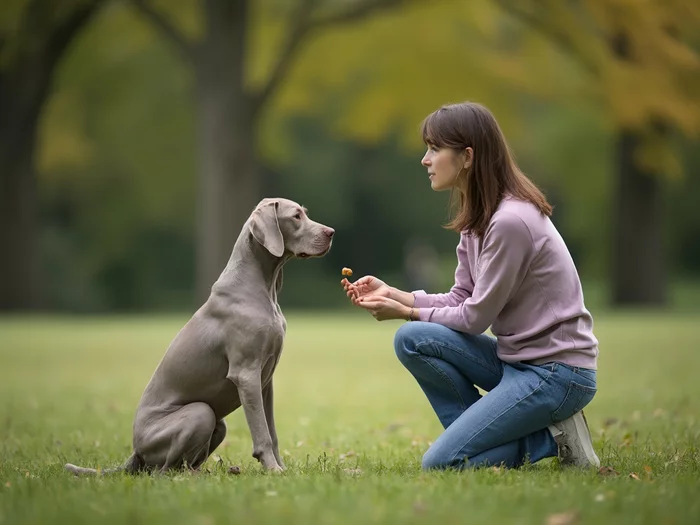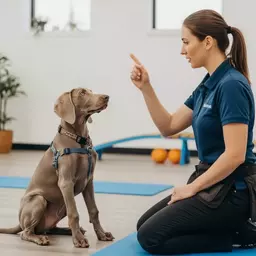Weimaraner Obedience Training Guide

Posted on: 2025-10-10
By: Cameron F. McAllister
Training your Weimaraner is not just about commands; it’s a journey of companionship and understanding. As you embark on this adventure, consider how each step you take strengthens your bond with your furry friend.
What You Will Learn
- Obedience training is essential for enhancing safety and communication between you and your Weimaraner.
- Consistency and patience are critical in establishing effective training routines.
- Recognizing the unique traits of Weimaraners, such as their high energy and intelligence, can tailor your training approach.
- Positive reinforcement is vital for fostering a fun and engaging training environment.
- Socialization during training helps your dog adapt well to various situations and interactions.
- Ongoing education and community support can enhance your training experience and deepen your bond with your dog.
The Weimaraner Training Journey: Phases & Key Traits
This visual outlines the anticipated phases of Weimaraner training and essential breed characteristics that influence the process.
Understanding Weimaraner Obedience Training
When it comes to welcoming a Weimaraner into your family, understanding the importance of obedience training is crucial. This breed, known for its intelligence and energetic nature, thrives on structure and guidance. Obedience training not only helps in shaping their behavior but also strengthens the bond between you and your furry companion. Trust me, a well-trained Weimaraner is not only a joy to be around but is also safer in various situations!
As you embark on this training journey, it’s essential to remember that patience and consistency are key. These dogs are eager to please, but they also need clear expectations from their owners. So, let’s dive deeper into why obedience training is not just a task, but a vital aspect of raising a happy and well-adjusted Weimaraner.
Why Obedience Training is Essential for Weimaraners
- Promotes Safety: A well-trained Weimaraner can follow commands that keep them safe in potentially dangerous situations.
- Enhances Socialization: Training helps your dog interact positively with other dogs and humans.
- Builds Confidence: Learning commands boosts their confidence, making them more adaptable in new environments.
- Strengthens the Bond: Working together through training enhances the relationship between you and your pup.
As I often say, teaching these dogs is as much about the bond you share as it is about the commands they learn. Each command learned is a step towards a deeper understanding of each other, making every moment spent in training worthwhile!
What to Expect During the Training Process
Training a Weimaraner can be a rewarding experience, but it’s important to understand what to expect along the way. Initially, your puppy may show some hesitancy or distraction, especially in unfamiliar environments. However, with consistent practice, you'll begin to see progress. Here are some key phases of training you can anticipate:
- Initial Learning: Your Weimaraner will be learning the basic commands, which might take time as they grasp each concept.
- Gradual Improvement: Over time, you'll notice they become more responsive and eager to follow commands.
- Refinement: This phase involves reinforcing what they've learned and introducing new commands.
- Real-World Application: Eventually, you’ll practice commands in various settings, ensuring your dog can respond well in different environments.
Remember, throughout this journey, it's essential to celebrate the small victories! Each time your Weimaraner successfully follows a command, it’s a moment worth acknowledging. Positive reinforcement plays a significant role in this process, creating a fun and effective training atmosphere.
Recognizing Weimaraner Breed Characteristics in Training
Understanding the unique characteristics of Weimaraners can significantly enhance your training approach. This breed is known for its high energy levels, intelligence, and strong hunting instincts. Therefore, training must be tailored to fit their specific needs. Here are some traits to keep in mind:
- High Energy: Weimaraners require plenty of physical activity alongside mental stimulation. Incorporate play into training sessions to keep them engaged!
- Intelligence: They're quick learners! Be prepared for training to progress rapidly if you use clear and consistent commands.
- Affectionate Nature: Weimaraners thrive on companionship and positive interactions. Make sure to include plenty of affection in your training routine.
- Curiosity: Their inquisitive nature means they might get distracted easily. Keep training sessions short and filled with variety.
By recognizing these breed traits, you can tailor your training methods to suit their personality, making the process both effective and enjoyable. For more detailed information on their characteristics, you can refer to insights from the American Kennel Club (AKC). Remember, patience and understanding go a long way in nurturing your Weimaraner's obedience!
Pro Tip
To enhance your Weimaraner’s training experience, consider incorporating short, playful activities between training sessions. This not only keeps your dog engaged but also reinforces the skills they’ve learned. Activities like fetch or agility exercises can provide the mental stimulation they crave while making training enjoyable!
Frequently Asked Questions About Weimaraner Training
Why is obedience training crucial for Weimaraners?
Obedience training is crucial for Weimaraners because it promotes their safety, enhances their socialization with other dogs and humans, builds their confidence, and strengthens the bond between them and their owners. Given their high energy and intelligence, structure and guidance are essential for their well-being.
What specific traits of Weimaraners should I consider during training?
When training a Weimaraner, consider their high energy levels, intelligence, affectionate nature, and curiosity. These traits mean they require ample physical and mental activity, respond well to clear commands, thrive on companionship, and can be easily distracted, necessitating varied and short training sessions.
How important are consistency and patience in Weimaraner training?
Consistency and patience are key. Weimaraners are eager to please but need clear expectations. Consistent routines help them understand what is expected, while patience allows them to grasp new concepts at their own pace, making the training process more effective and less stressful for both dog and owner.
What role does positive reinforcement play in training a Weimaraner?
Positive reinforcement is vital for fostering a fun and engaging training environment. It helps to create a strong, positive association with learning and encourages desirable behaviors. Celebrating small victories and offering affection and rewards strengthens your bond and makes training enjoyable for your Weimaraner.
Where can I find additional support and resources for Weimaraner training?
You can find additional support by joining communities of Weimaraner owners (online forums, social media groups, local meetups), enrolling in advanced training classes, and exploring various resources like books, instructional videos, and online courses specifically tailored to the breed. Organizations like the Weimaraner Club of America and resources from the Canine Health Information Center (CHIC) can also provide valuable insights and community connections.
Summarizing the Importance of Weimaraner Obedience Training
As we've explored, Weimaraner obedience training is not just about teaching commands—it's about fostering a strong relationship built on trust and respect. Understanding the need for training helps set the foundation for a happy, well-adjusted pup. When we invest time in this process, we set ourselves up for a rewarding experience with our furry companions!
Here are some key takeaways to remember:
- Obedience training enhances communication between you and your Weimaraner.
- Consistent training routines build confidence in your dog.
- Positive reinforcement leads to long-lasting behaviors.
- Socialization is crucial for a well-rounded Weimaraner.
By keeping these points in mind, you can ensure that your training journey is both effective and enjoyable for both you and your new friend!
Next Steps for Continued Training and Development
Once you feel confident in your Weimaraner's basic commands, it's time to think about the next steps. Continuing education is key to keeping your pup mentally stimulated and well-behaved. Here’s how you can keep that momentum going:
- Enroll in advanced training classes.
- Practice new commands regularly.
- Introduce fun games that reinforce obedience.
- Consider agility training to engage their physical and mental skills.
Every new skill learned can deepen the bond between you and your Weimaraner. Plus, it’s a great way to have fun together!
Join a Community of Weimaraner Owners for Support and Tips
Being part of a community can make a world of difference in your training journey. Connecting with other Weimaraner owners allows you to share experiences, challenges, and tips! For instance, the Weimaraner Club of America offers a great way to connect with dedicated breed enthusiasts. Here are some ways to engage:
- Participate in online forums or social media groups.
- Attend local meetups or dog shows.
- Exchange training insights with fellow owners.
- Seek advice from seasoned trainers within the community.
These connections can provide valuable insights that enhance your training approach and make you feel more supported as a new pet parent.
Exploring Resources: Books, Videos, and Online Courses for Weimaraner Training
As a dedicated Weimaraner owner, you’ll want to continuously educate yourself. There are fantastic resources out there that cater specifically to the needs of the breed. For health-related information and breed-specific data, checking the Canine Health Information Center (CHIC) is highly recommended. Here are some suggestions to explore:
- Books focused on Weimaraner training and care.
- Instructional videos that demonstrate effective techniques.
- Online courses that offer structured learning.
- Podcasts featuring discussions on Weimaraner behavior and training.
By utilizing these resources, you’ll not only improve your training skills but also gain a deeper appreciation for the wonderful traits of Weimaraners. Remember, the journey of training is ongoing, and there’s always something new to learn together!
Recap of Key Points
Here is a quick recap of the important points discussed in the article:
- Obedience training is essential for ensuring safety, enhancing socialization, and building confidence in Weimaraners.
- Consistency and patience are key to successful training, as Weimaraners thrive on clear expectations.
- Positive reinforcement creates a fun and effective training atmosphere, helping to nurture a strong bond between you and your dog.
- Tailoring your training methods to the unique characteristics of Weimaraners, such as their high energy and intelligence, can lead to more effective results.
- Continued education and community engagement are crucial for ongoing development and support in the training journey.
 Choosing to train your Weimaraner puppy is not just about obedience; it’s about forging a lifelong
Choosing to train your Weimaraner puppy is not just about obedience; it’s about forging a lifelong
 Choosing a reputable breeder is essential for ensuring a healthy, happy Weimaraner puppy. Here are k
Choosing a reputable breeder is essential for ensuring a healthy, happy Weimaraner puppy. Here are k
 Training your Weimaraner is not just about commands; it’s a journey of companionship and understan
Training your Weimaraner is not just about commands; it’s a journey of companionship and understan
